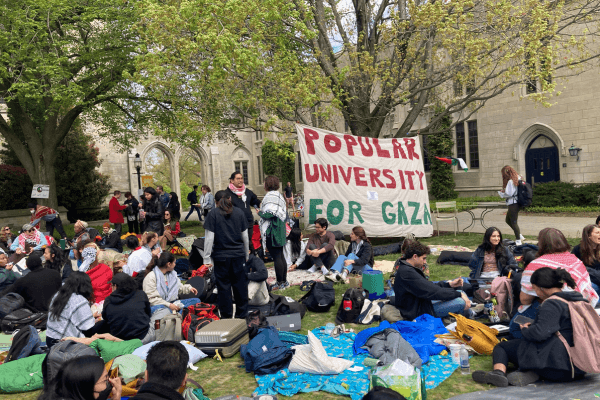Last week, we breathed a collective sigh of relief when the Supreme Court blocked the Trump administration’s attempt at ending DACA. The news brought rest. New applicants will be able to seek protections under this program again. Current DACAmented people won’t have to live in fear that their job and permanency could end any minute. This is a great move in the right direction to acknowledge that those whose home has been this land belong here. We celebrate this momentous victory and this glimpse of hope.
But it is not enough. The rest is only temporary.
Immigration policies are often incomplete solutions. They leave out people in the most vulnerable circumstances and provide little to no opportunities to those who live outside the parameters of whiteness, touting individual achievements that were actually obtained on the back of slave and immigrant labor.
This imagination fails to recognize that the land where this country sits is occupied land, stolen by European ancestors. Though DACA has benefited Asian, African, and European immigrants, the majority of DACAmented people were born in Latin America. The ties to the land we know as the Americas goes deeper for many DACAmented folx. It is a shame that though many of their ancestors were indigenous to these lands, they must now fight to be afforded temporary provisions and protections.
This toxic imagination around immigration often leaks onto the imagination of immigrant people.
The U.S. imagination around immigration policy has often been limited to rewarding the merits of “good immigrants” who must prove themselves worthy of sharing a space with those who believe they have worked hard to obtain it. Good immigrants respect the law, keeping their cars impeccable with no broken headlights to prevent them from being stopped and questioned about their immigration status. Good immigrants don’t get sick, they are faithful workers always available to perform essential work. Good immigrants are ever grateful for the opportunities afforded to them and don’t complain. The demands placed around the conception of the “good immigrant” are an unrealistic myth.
As I entered the workforce a friend and I had a mantra, “We have to make ourselves indispensable to our employers so they will find a way to keep us.”
We would say it in our minds anytime we felt tired or faced challenges at work. Immigrant people have often resorted to similar mantras, working hard to become essential to economies and communities because we have been led to believe we must justify our presence in this country through our hard work and positive contributions. We are also led to believe we can only find allies in our struggle if we represent a profitable benefit to them. We have evidence that it works. So I became essential and my employer at the time found a way to sponsor me through a religious visa (I was one of the first people in this 60+ year-old company with 5000 + U.S. employees had sponsored).
But I paid the price in the mental, emotional, and physical labor that helped me build up the “good immigrant” persona. I paid the price in surrendering my ability to visit my family in my home country due to immigration restrictions for six years. I paid the price in dissenting with as much shrewdness and wisdom as I could lest they would fire me and I would lose my ability to remain in the country legally. I paid the price in muting my voice and I am still paying the price in learning to recover it.
Immigrants have been willing to carry these oppressive burdens because there are no other options to make a way for our status in the system. The mantras playing in our head are the horrific echoes of a system that values immigrant people because of their economic contribution and slowly takes away their breath in favor of building an empire.
As our DACAmented siblings breathed in joy and relief, we must increase our commitment to creating systems that allow people to breathe freely and abundantly. In matters of immigration, we must dare to dream together of policies that recognize the inherent value of every person and every community because they are all made into the image of God. We must continue to reimagine and birth a different future until all are able to live, breathe, and thrive freely without fear.
Got something to say about what you're reading? We value your feedback!







